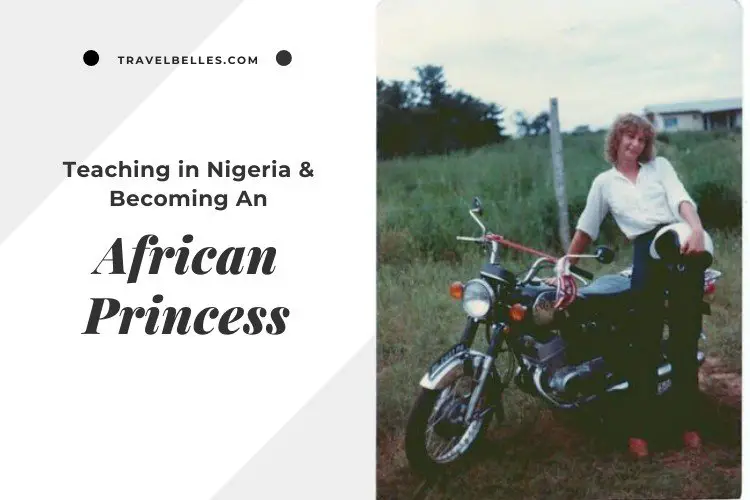One woman’s chance transformation into Nigerian royalty
In 1981, I applied for teaching positions overseas, as I’d had enough of the cold and snow in northern Canada. Subsequently, I was posted to a boys’ government secondary school in Africa – in Kurgwi, a small town in central Nigeria.
Moving to a bush village that I hadn’t been able to find on a map before leaving Canada – with no electricity or running water and where most of the locals had never seen a white woman – was a character-building experience.
The first day I walked the mile or so from the school compound into the village. Small children stared at me with wide eyes, screamed and scampered behind their parents. In West African traditions, devils are white so it’s no wonder the kids were terrified. The embarrassed parents apologized profusely in pidgin English; I found it highly amusing, as there are worse things than being a devil woman.

The local people named me Lamai, a woman born on Thursday. Had my Hausa vocabulary been better I would have stayed away for another day so I would have been called Jummaa, woman born on Friday.
My habits and attitudes caused local speculation about who I was and where I came from. How was it that I knew a few words of Hausa, ate with my right hand, bargained in the market and generally coped? White women were supposed to be distant, arrogant and rather aloof, and I didn’t fit that stereotypical image.
One evening the Chief of the village came down to the market and announced that Lamia was, in fact, the mulatto daughter of the Chief of Qua, a settlement about 15 miles further into the bush. The story evolved that many years ago, a white missionary woman had traveled in the area and she was impregnated by the Chief of Qua. She’d gone back to her own country – over there somewhere – but the child loved Africa and she’d returned. And she was me, Lamai.
The next day I walked to the village and everyone genuflected and addressed me as Rankaditti, which roughly translated as “Princess.” Confused and not knowing what to do, I genuflected back. It wasn’t until the students explained what had happened that I realized my status had been elevated. When I tried to explain that I was Canadian, the locals dismissed it, saying “Oh yes, your mother’s country.”
Being socially reconstructed as the mulatto daughter of the Chief of Qua – and accorded all the privileges befitting my station – was a serendipitous experience to treasure.
Consequently, I had the best of both worlds. When I remembered the greetings in Hausa – a rather long and formal process – it was because I was the mulatto daughter of the Chief of Qua; when I roamed around on my motorcycle, smoked cigars or went to the local bar, it was because I was schooled in my mother’s country.
My stint of royalty lasted only two years, but being a princess added yet another often-told story to my collection.
Pin for Later


That is absolutely fantastic, Jody. 🙂 I’m grinning so big picturing your brave self being pronounced a princess whether you liked it or not. 🙂 Love it!
Hi Ayelet, I’m not sure if it was because I was the mulatto daughter of the Chief of Qua or because I was a white woman. But either way I enjoyed the experience. And it is one of those sorts of things that you could never plan in a thousand years. JH
Hi Jiodie,
I was down the road in Dengi, where I was sometimes asked if my mother used to pull my nose to make it so long and pointy. I remember the locals in Pankshin driving around your house to see first hand the insanely provocative sight of a white woman sun-bathing. Walai! We were reminiscing last night at the CUSO reunion with Molly Hurd. Best wishes,
Lawless